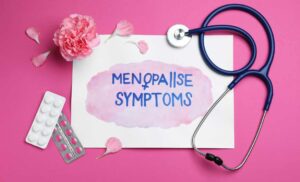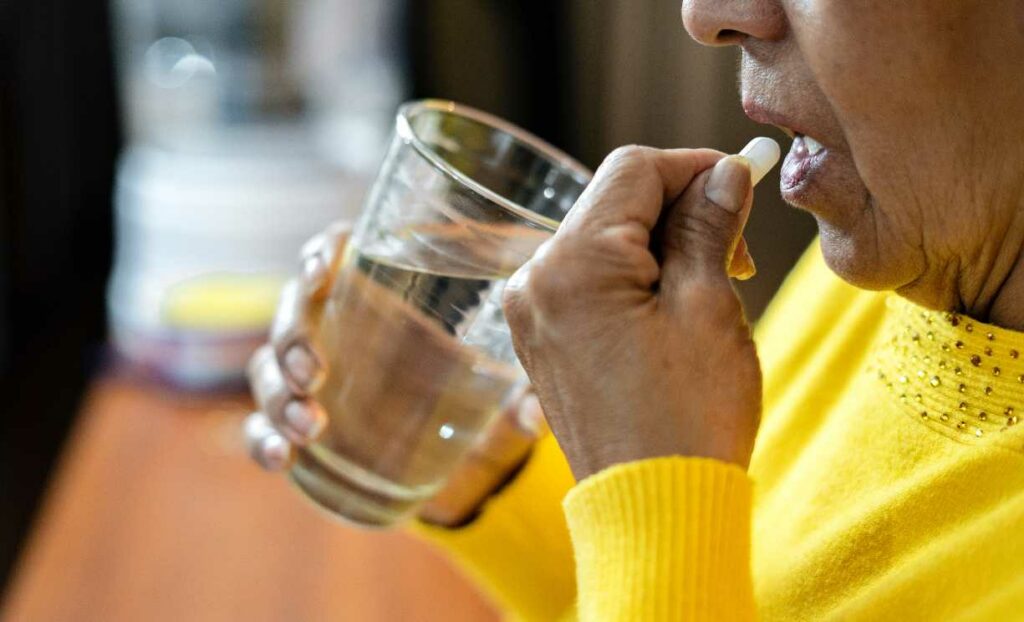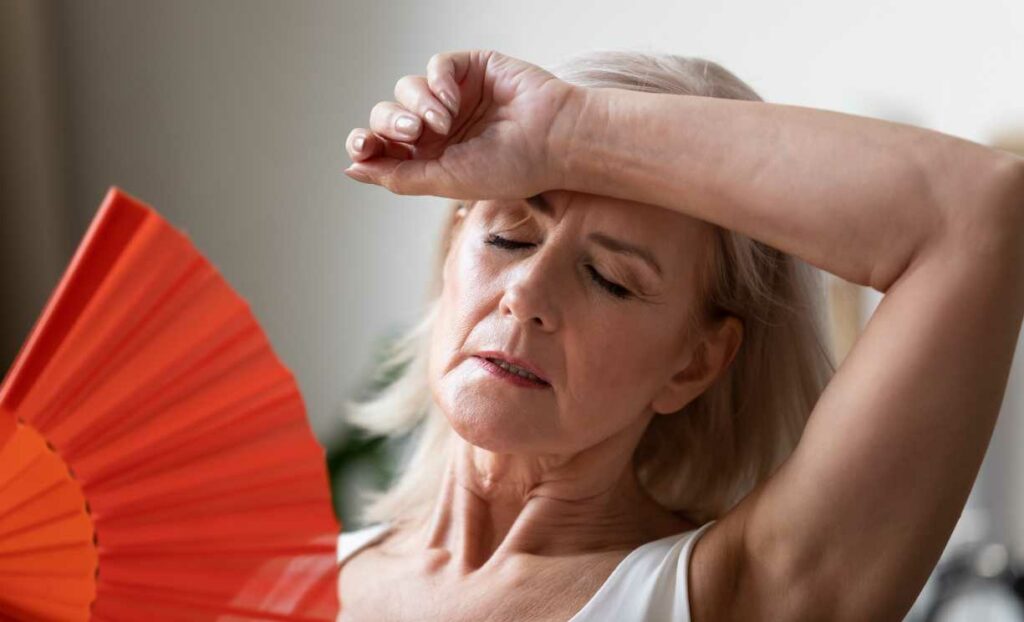Hot flashes and night sweats, common symptoms during menopause, can significantly impact a woman’s quality of life. While lifestyle changes and natural remedies may offer relief for some, medications play a crucial role in managing these symptoms. In this guide, we’ll explore various medications designed to alleviate hot flashes and night sweats, providing women with options for finding comfort during this transitional phase.
Contents
Understanding Hot Flashes and Night Sweats
Hot flashes and night sweats are common experiences, particularly among women going through menopause. Hot flashes are sudden sensations of intense warmth, often accompanied by rapid heartbeat, sweating, and reddening of the skin. They can happen during the day or night, disrupting daily activities and sleep. Night sweats, as the name suggests, are episodes of excessive sweating during the night. These occurrences can lead to waking up feeling drenched and uncomfortable.
Both hot flashes and night sweats are primarily associated with hormonal changes, particularly the decrease in estrogen levels that occurs during menopause. While they are natural parts of this life stage, the intensity and frequency can vary from person to person, impacting the overall quality of life. Managing these symptoms often involves a combination of lifestyle adjustments, natural remedies, and, in some cases, medications prescribed under the guidance of healthcare professionals.
Why Does Menopause Cause Night Sweats And Hot Flashes?
Medicines For Hot Flashes And Night Sweats
Several medications are commonly prescribed to manage hot flashes and night sweats, especially in the context of menopause. Here are some medications that healthcare providers may recommend:
- Hormone Replacement Therapy (HRT): Hormone Replacement Therapy involves supplementing the declining levels of estrogen with hormones. This method aims to effectively reduce hot flashes, night sweats, and other menopausal symptoms by restoring hormonal balance. Individuals must engage in a thorough discussion with their healthcare provider to understand potential side effects and benefits.
- Selective Serotonin Reuptake Inhibitors (SSRIs) and Serotonin-Norepinephrine Reuptake Inhibitors (SNRIs): Originally designed as antidepressants, SSRIs and SNRIs have demonstrated efficacy in reducing the frequency and severity of hot flashes. These medications work by affecting neurotransmitters in the brain, helping manage mood, and simultaneously alleviating hot flashes. The individual response to these medications may vary, and it’s important to discuss potential side effects with a healthcare provider.
- Gabapentin and Pregabalin: Initially developed to treat seizures, these medications have proven effective in reducing hot flashes. Offering relief from both hot flashes and potential improvement in sleep quality, gabapentin, and pregabalin are considered for individuals experiencing menopausal symptoms. However, it’s crucial to discuss potential side effects and individual considerations with a healthcare provider before initiating treatment.
- Clonidine: Originally prescribed as a blood pressure medication, clonidine has shown effectiveness in reducing the frequency of hot flashes. By acting on certain receptors in the brain, clonidine helps diminish the occurrence of these sudden sensations of warmth. Monitoring blood pressure is essential during the use of clonidine, and individuals should discuss potential side effects with their healthcare provider.
- Hormonal Antidepressants: Certain antidepressants, such as venlafaxine, have demonstrated efficacy in reducing hot flashes. By affecting the levels of neurotransmitters in the brain, these medications provide relief from hot flashes while potentially contributing to mood management. As with any medication, individual responses and potential side effects should be discussed thoroughly with a healthcare provider before initiation.
How To Manage Hot Flashes And Night Sweats?
Managing hot flashes and night sweats at home involves adopting lifestyle changes and incorporating strategies that may help alleviate these symptoms. While individual responses vary, here are some self-care tips that individuals can consider:
- Dress in Layers: Wearing lightweight, breathable fabrics allows for easy adjustment to changes in body temperature. Layering clothing can help manage fluctuations in temperature more effectively.
- Cooling Bedding: Invest in cooling bedding, such as moisture-wicking sheets and breathable blankets, to help regulate body temperature during sleep.
- Healthy Eating: Maintain a balanced diet with an emphasis on whole foods. Some individuals find that avoiding spicy foods, hot beverages, and large meals can help minimize hot flashes.
- Regular Exercise: Engage in regular physical activity. Exercise not only promotes overall health but can also help manage stress, which may contribute to the frequency of hot flashes.
- Mind-Body Techniques: Practice relaxation techniques such as deep breathing, meditation, or yoga. These approaches can help reduce stress and anxiety, potentially decreasing the occurrence of hot flashes.
- Keep a Symptom Diary: Keep track of when hot flashes and night sweats occur, along with potential triggers. Identifying patterns can help you make informed lifestyle adjustments.
- Maintain a Consistent Sleep Schedule: Establish a regular sleep routine with consistent bedtimes and wake-up times. Quality sleep is essential for overall well-being and may positively impact the frequency of night sweats.
- Natural Remedies: Some individuals find relief through natural remedies like herbal supplements or dietary changes. Examples include black cohosh, soy isoflavones, and flaxseed. However, it’s crucial to consult with a healthcare provider before trying any supplements.
- Mindfulness and Stress Reduction: Practices such as mindfulness meditation and stress reduction techniques can contribute to an overall sense of well-being and may help manage hot flashes.
Conclusion
In navigating the challenges of hot flashes and night sweats, understanding the available medications and incorporating self-care strategies becomes pivotal. Medications like Hormone Replacement Therapy (HRT), SSRIs, SNRIs, and others offer targeted relief, often with the guidance of healthcare professionals. However, a holistic approach to symptom management involves self-care practices that individuals can implement on their own. From staying cool and hydrated to adopting mindfulness techniques and making lifestyle adjustments, these strategies empower individuals to take an active role in their well-being.
The journey through hot flashes and night sweats is unique for each person, and finding the right combination of medications and self-care practices can significantly enhance the quality of life during this transitional phase. Always consult with healthcare professionals for personalized advice and a tailored approach to effectively manage these symptoms.
If you are facing menopause-related issues, menopause treatment at HerMantra can help. Book your free trial online menopause treatment session now.





